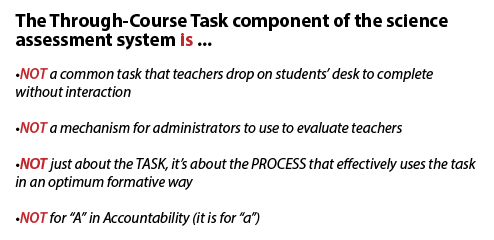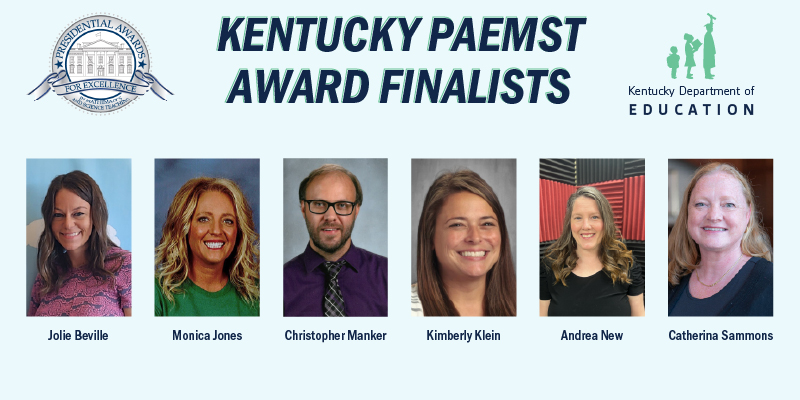Kentucky science teachers tried something new this year, and there is little doubt that the through-course task (TCT) component of the new Science Assessment System can make a big difference in science education across the Commonwealth.
“I visited a 7th-grade science classroom and was immediately struck by level of energy, focused discussion and authentic engagement,” said Owens Saylor, superintendent of Daviess County. “When I asked one of the students what they were doing, she responded by showing me the TCT. It was thrilling to watch their passion.
“Most importantly, it reflected the kind of intellectual heavy lifting that we’ve been craving for our students. It was one of the best examples of assessment for learning that I’ve seen. If this is the future of assessment, count me in!”
That’s exciting testimony for Kentucky’s through-course task field test. But to ensure that the TCTs will make a big difference in Kentucky science education, all stakeholders need to work together to support the full development of this part of the assessment system. That means understanding the intent and appropriate use of the TCT process, and providing support according to your role as the development work continues.
As part of the TCT field test, all Kentucky teachers of science – grades kindergarten through high school – used a through-course task with their students this spring. TCTs are intended to be used by grade level teacher teams so that science educators grow together using a 3-step collaborative process around a common formative assessment task. In this process, teacher teams:
- plan for using the task,
- facilitate the task with students, and
- evaluate student work and reflect.
It should be emphasized that the experience is formative for teachers and students, and hence, the task is facilitated, and not simply handed to students to complete. Guidance for TCT facilitation can be found here.

While there are many intended outcomes to this part of the assessment system, some of the larger ones include:
- Calibrating expectations for student performance in 3-dimensional sense-making, with implications for curriculum, instruction and assessment in various capacities;
- Developing understanding for design and use of 3-dimensional sense-making tasks at all grade levels, with particular emphasis on eliciting evidence of student understanding with respect to the science and engineering practices and cross-cutting concepts; and
- Furthering educators’ proficiency with the formative assessment process, especially with respect to providing appropriate feedback and support for the science and engineering practices and cross-cutting concepts.
The Kentucky Department of Education (KDE) manages and supports development of the tasks used as TCTs, but the tasks are developed by Kentucky teachers and used with Kentucky students before they are made available for use. Two tasks per grade level were available for this year’s field test and more will populate the SharePoint bank, which is available to Kentucky teachers here.
Beginning in June, KDE will support selected Kentucky teachers as they develop new tasks to be used with students in the fall and added to the TCT resource bank. KDE hopes to add six more tasks per grade level through this effort.
It should be noted that designing rich tasks that reflect the intent of Kentucky’s Academic Standards for Science is challenging, pioneering work. Kentucky is a leader nationally in this work, and our science educators will continue to grow. Not only will more tasks become available, but they also will improve. Patience and support are necessary as the TCT resource bank expands and improves.
Kentucky teachers’ reaction to the TCT field test has been positive, yet mixed to some extent. About 60-65 percent of teachers who responded to a survey felt they learned “some” to “a lot” about their students’ relative capacities in 3D sense-making, how to get evidence of student understanding and how to facilitate science learning through use of the tasks.
More than 2,000 Kentucky teachers responded to the survey after completing the field test. A deeper dive into the results suggests some confusion around how TCTs are to be used, and this likely affected teachers’ experience with the tasks.
For example, some comments indicated that a TCT is viewed as a test rather than a task to be facilitated with students as part of a formative process. Others indicated concern that there was not one clear correct answer, or they were not aware they were supposed to use a collaborative process. And still others felt that the TCTs should reflect the multiple-choice/extended-response structure of the new summative assessment that also was field tested this spring.

It’s important for all people connected with science education in Kentucky to become educated about the TCT component of the new science assessment system and to support development of all aspects – from task development and appropriate task use to understanding of and proficiency with the collaborative process for using TCTs. Several documents are available on the KDE Science Assessment page provide answers to frequently asked questions surrounding the TCT task and the TCT process.
Mindy Curless is a STEM consultant at the Kentucky Department of Education.




Leave A Comment